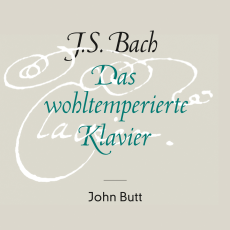John Butt - Bach WTC - Gramophone
It's interesting that many harpsichordists purport to approach Bach's Well-Tempered Clavier with scholarly authority, yet still come up with disparate interpretations. Consider the work's modern-day discography: you can choose between straightforward/leisurely (Gilvert/DG, Van Asperen/EMI); straightforward/moderate (Schornsheim/Capriccio, Moroney/Harmonia Mundi); straightforward-ish/fast (Newman/903 Records); agogic freedom/leisurely/often shapeless (Egarr/Harmonia Mundi); and now John Butt's agogic freedom/mostly fast and well shaped.
Harmonic tension and release govern the Book 1 C major Prelude's varying phrase-lengths, although its fugue's majestic stretto textures become congested at Butt's impatient pace. The C sharp major Prelude lilts with air in between the notes, even when the tempo marginally slows to allow the bass notes more resonant ‘oomph', but the often austere C sharp minor Fugue is raring to dance the polka. The D sharp minor Fugue transpires faster than what you'd expect, following a rather choppy strum through the Prelude. But the F sharp minor Fugue's contrasting motifs benefit from Butt's animation and supple control as the counterpoint dances over the barlines. I also like the tiny emphasis on the A major Fugue subject's opening note, from which the subsequent rising patterns tag along like the tail of a kite, making the most of Bach's cross-rhythmic effects. Butt's autoharp-like arpeggiations make the B flat minor Prelude sound like an intimate folksong rather than the usual weighty tome, while a welcome alla breve pace helps unify the B minor Prelude's accentuations.
The rich timbral variety of Butt's responsive harpsichord (modelled after a Mietke instrument familiar to Bach himself) reveals itself at the pedal point right at the start of Book 2's C major Prelude, and in the inner voices emerging from the C sharp major Prelude's full-bodied left-hand chords. Listeners resigned to heavy, ponderous readings of the D major, E flat and B flat minor Fugues will be relieved at Butt's joyful speeds, as well as his fluid and flexible accounts of the ricecare-like F sharp minor and E major Fugues. Rightly or wrongly, Butt points up the D minor Fugue's alternating triplet and duple rhythms with more rhythmic freedom than usual but the F major Fugue's skipping gait is steady and light. Strangely, Butt fusses over and sectionalises the F minor Prelude, yet brings out the G minor Prelude's French-overture character and delineates the G minor Fugue's hard-to-clarify counterpoint to perfection. Also note the G sharp minor Fugue's uncommonly fast tempo and asymmetrical phrasing. While Christine Schornsheim's recent edition benefits from more spacious engineering and artistic consistency, Butt offers plenty of food for thought, along with his own extensive annotations discussing both the music and issues of performance practice.

